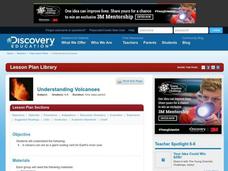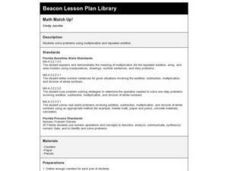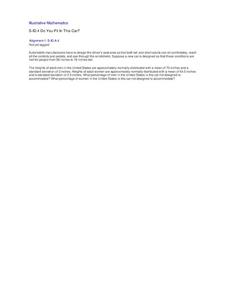Curated OER
Understanding Volcanoes
Students create a model volcano in groups, and discuss what each part of the model represents as they go along. In this volcano lesson, students come back together as a whole group and discuss what group did the best work,...
Discovery Education
Sonar & Echolocation
A well-designed, comprehensive, and attractive slide show supports direct instruction on how sonar and echolocation work. Contained within the slides are links to interactive websites and instructions for using apps on a mobile device to...
Curated OER
Physical Science: The Three Billy Goats Gruff
Explore science through problem solving and learning how to solve the problem of the story "The Three Billy Goats Gruff." Young investigators will learn how to construct a model and design a solution. They will also keep records of their...
Curated OER
Sandwich Stratigraphy
Two activities are included in this resource. In the first, junior geologists model sedimentary rock layers, apply the Law of Superposition, and demonstrate folding and faulting of the Earth's crust. The model is technically a sandwich....
Channel Islands Film
Island Rotation: Lesson Plan 2
Why are Torrey pines only found in La Jolla, California and on Santa Rosa Island? Class members examine images of Torrey pines from these two locations, noting the similarities and differences, and then develop a demonstration model that...
Curated OER
Every Building Tells a Story
Examine images from past that depict buildings and towns from their own communities, and compare images with photographs taken at present locations, interview local architect and compare role of 19th Century architect to 21st Century...
Inside Mathematics
Population
Population density, it is not all that it is plotted to be. Pupils analyze a scatter plot of population versus area for some of the states in the US. The class members respond to eight questions about the graph, specific points and...
Institute for Humane Education
Where Are the People like Me?
Are some characteristics more desired than others?Scholars examine attributes of characters in books, models in catalogs, and articles in magazines. Discussion leads to identifying characteristics they see more often as well as...
Curated OER
Avalanche!
Students build a model representing a snow-covered mountain out of flour, sugar, and potato flakes. Then they use the model to recreate an avalanche.
Curated OER
Troublesome Towers
Students observe solids and identify parts that make up the surface area. In this geometry lesson, students calculate the surface are of solids and cones. They find polygons and solids in the real world.
Curated OER
Bringing the Solar System Down to Earth
Middle schoolers develop a scaled down model of the solar system. In small groups, they calculate the scaled-down diameters of the planets and the sun, the scaled-down distance of the planets from the sun, complete two charts, and...
Virginia Department of Education
Researching Information on the Internet
Practice Internet research skills. Each class member will need Internet access in order to follow along as you model how to search using key words and to do their own research on African and Asian elephants. Their notes will go into a...
Curated OER
Math Match Up!
Help learners solve problems using multiplication and repeated addition. Using counters, learners will be paired up to solve problems. They will go through a series of questions and show models with the counters for the solution. Then...
Curated OER
Building A Model of the East Pacific Rise
Pupils describe the physical attributes of the East Pacific Rise. After locating the region on a map, students work in groups do define each layer of the structure in order to begin their build. Pupils build their model according to map...
EngageNY
Multiplying Polynomials
There's only one way to multiply, right? Not when it comes to polynomials. Reach each individual by incorporating various representations to multiplying polynomials. This lesson approaches multiplying polynomials from all angles. Build...
Illustrative Mathematics
Do You Fit In This Car?
A short activity that focuses on the normal distribution as a model for data distribution. Using given means and standard deviations, your budding statisticians can use statistical tables, calculators, or other statistical software to...
Curated OER
What in Our World Affects the Way People Live
Sixth graders study various maps that show geographical features and population. They compare the maps and make inferences about how various geographical features influence the population and human activities of an area.
Curated OER
America Grows - Trailblazers Pave the Way
Pupils study the time period after the Revolutionary War when people were striving to move away from the coastal areas and look for pathways to the west. Westerward expansion is a central theme and students use a variety of resources to...
Curated OER
Multiplication: Building Models, Representations and Explanations
First graders explore multiplication concepts through skip counting, repeated addition and arrays. Using animal characteristics as a context, 1st graders solve problems using mathematical tools such as hundreds charts, number lines, ...
Statistics Education Web
Walk the Line
How confident are you? Explore the meaning of a confidence interval using class collected data. Learners analyze data and follow the steps to determine a 95 percent confidence interval. They then interpret the meaning of the confidence...
University of California
Energy and Biomass Pyramids
Young scientists play tag as they act out the food pyramid in the ocean ecosystem. Energy circles pass from the smaller prey to the predators and at the end of the activity, a data chart and analysis questions allow pupils to apply their...
Flipped Math
Unit 9 Review: Factoring
Make it complete. Pupils work through 16 problems to review factoring. The problems consist of straight factoring of polynomial expressions, solving equations by factoring, and applying factoring to real-world problems.
Curated OER
Planning a Healthy City
Ninth graders create a scaled model city. They create a blueprint that provides for the economic and cultural needs of a community. They identify where essential elements of the city should be located and explain the rationale for the...
Curated OER
The Spider Beside Her
Second graders are introduced to the characteristics of spiders. In groups, they compare and contrast spiders to different insects to discover spiders are not an insect at all. In groups, they create a model of a spider and discuss its...

























